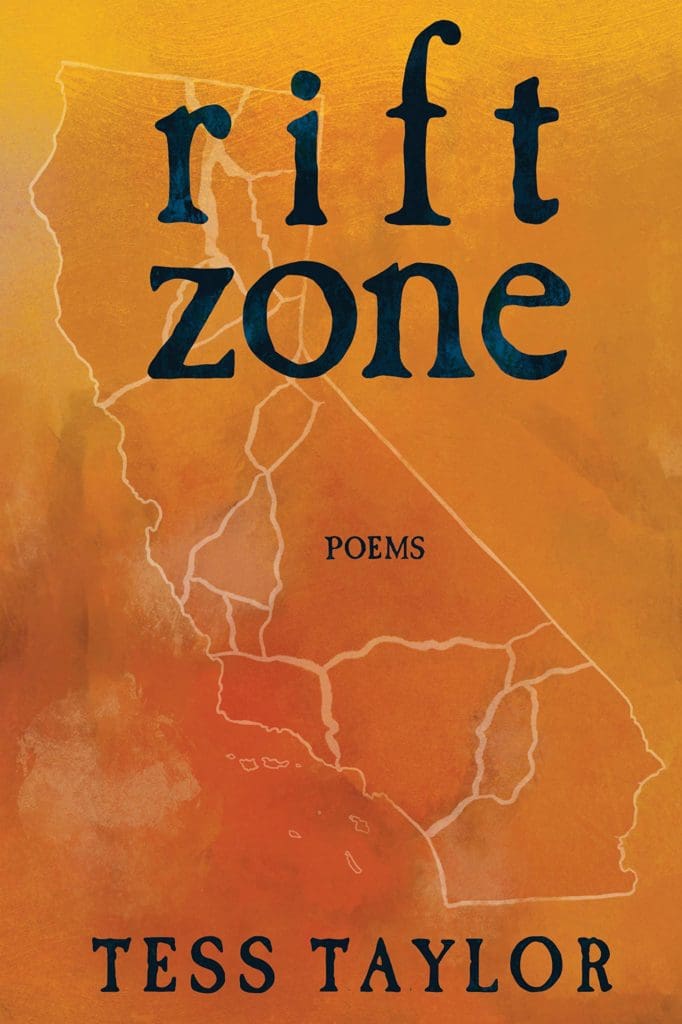Here is the strange thing: I was already writing poems about the precariousness of California. I’d been writing them for ten years, since I moved back from New York and came back to the East Bay after two decades away. That was 2011. I had just had a baby. At first, it seemed like I was only trying to make sense of the difference between the California I’d grown up in and the California I came back to, but as I wrote, it seemed like I was also trying to make sense of the world, how it had abruptly shifted under our feet, how radically strange it was to be in a place that was at once so prosperous (some of us have clearly won the revolution for expensive cheese) and yet so broken (so many of us have clearly lost the revolution for equity, affordable housing, decent health care, excellent public schools). When I was away in New York, circling the rungs of publishing (it felt like an endless castle with many locked doors), I had written poems to California, and they amounted to wanting sunshine and a lemon tree. They amounted to missing the tang of sage and eucalyptus on a good day; the mercury glaze of sun in February. Coming back to the suburb I’d left two decades before was a sudden heaven: We could afford a broken bungalow, a yard with two huge redwood trees. We cleared out the weeds and planted that lemon tree. The baby grew.
It was a dream, the California dream, one version of it. But even as I settled in, I could already read a kind of violence in the landscape—of my childhood school district, scarred with gun violence and racial disparity; of my town, which I only learned later had racist housing codes you could still find in the escrow files; which I only learned later had been a ground zero for Japanese internment. I felt I could read the violence we’d done to the land itself, the blocky suburb with its odd mass of half-silent buried streams, its casual boom and bust sprawl, its park that became a park only because the quarry was exhausted. By then, our son was two. My husband became dangerously ill with a pneumonia no one could cure, a fact that feels newly significant now. He was hospitalized for a month and sick for six months after. We almost lost everything. We squeaked by in there-but-for fortune mode. We survived.
It’s a strange thing, though, to go on surviving when others aren’t—when fires skate by each fall, when there are 28,000 homeless people living in camps not far from you. It’s a strange thing to watch your home place and your country act out the heaving violence of a racism that seems stained deep in the soil, to seem bound into its endemic traumas. It’s a strange thing when your friends and neighbors are so close to the verge, and everyone lives in fear already, all the time—of guns in their schools, of losing their health care, of losing their homes.
I wrote Rift Zone about precarity, about standing on the fault line and trying to make sense of this beautiful but also deeply unsettled place I call home. I wrote poems of anger and tenderness and poems of despair and poems that savor lemons and light. I wrote poems of up-thrust. Now, of course, it is very hard to get out to read from this book of poems—the California I have written for is, at this moment, too apocalyptic even for my version of its apocalypse. But apocalypse also means “revelation,” and perhaps this is a moment when we realize again, and newly, how much our lives and histories and stories are linked—how much we need one another’s health and wellness to insure our own. Perhaps this is the moment we cultivate greater tenderness. I still hope the poems, which try to link this moment to the past and also dream about who we might yet need to be, will find a place here in the opening, in the rift between what is happening now and what might yet happen. I hope, possibly, they craft some small space to reroute and come back renewed. The rift is for the tearing apart, but also it is perhaps space for making sense of whatever is opening up. It is the fragile new land between the continental plates. As we stand at this brink, here by the sea, may we have the wisdom to know what to dream of. For now, I remember that poems share the intimacy of breath. They are one path–across time and distance—for linking our lives.
Tess Taylor is the author of five collections of poetry. Taylor’s work has appeared in The Atlantic, The Kenyon Review, Poetry, Tin House, The Times Literary Supplement, CNN, and The New York Times, and has served as the poetry critic for All Things Considered for over a decade. This spring, she is publishing two books of poems: Last West, part of “Dorothea Lange: Words & Pictures” at the Museum of Modern Art, which came out in February, and Rift Zone, from Red Hen Press, which publishes April 7. She teaches poetry and nonfiction at University of California, Davis.

